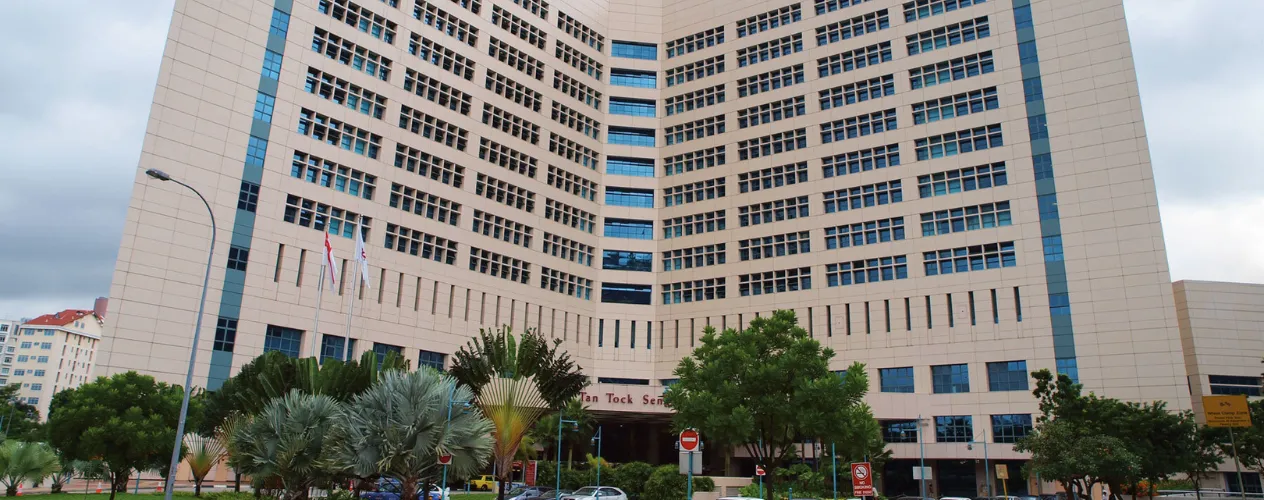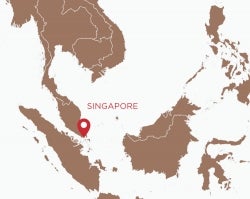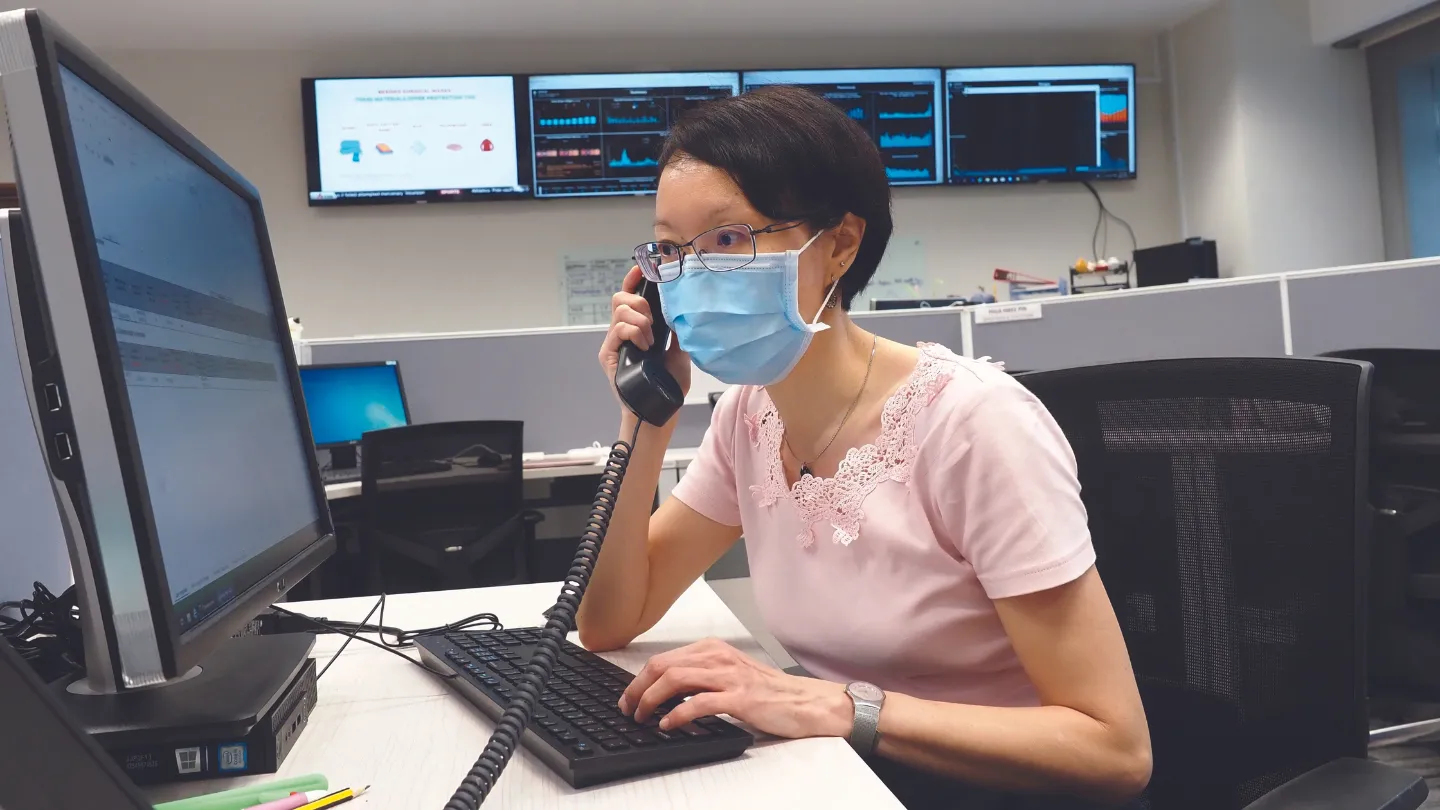On the Front Lines of a Global Pandemic
In Singapore, Fielding School alum Angela Chow is playing a key role in a response whose early success drew international praise.

AS THE GLOBAL COMMUNITY grappled with the COVID-19 pandemic early in 2020, one country that stood out as an exemplar of the impact a coordinated and proactive public health approach could have in containing an emerging infectious disease outbreak was Singapore, where Fielding School alum Angela Chow (PhD ’14) serves at the forefront of the response.
 Singapore reported its first COVID19 case on Jan. 23 and more soon followed — initially through travelers arriving from Wuhan, the capital of China’s Hubei province, where the outbreak originated. But Singapore’s public health response was swift — including canceling all inbound flights from Wuhan; imposing strict quarantines and restricting the movement of individuals who had recently been in affected areas; taking immediate steps to map the transmission of the novel coronavirus through polymerase chain reaction testing and tracing of contacts of people found to be infected; and amplifying campaigns to promote safe distancing, as well as personal and public hygiene strategies designed to reduce transmission.
Singapore reported its first COVID19 case on Jan. 23 and more soon followed — initially through travelers arriving from Wuhan, the capital of China’s Hubei province, where the outbreak originated. But Singapore’s public health response was swift — including canceling all inbound flights from Wuhan; imposing strict quarantines and restricting the movement of individuals who had recently been in affected areas; taking immediate steps to map the transmission of the novel coronavirus through polymerase chain reaction testing and tracing of contacts of people found to be infected; and amplifying campaigns to promote safe distancing, as well as personal and public hygiene strategies designed to reduce transmission.
Collectively, these actions resulted in a much flatter rate of case growth in Singapore during the early weeks of the pandemic than in European nations and the U.S. The early response drew praise from World Health Organization Director-General Tedros Adhanom Ghebreyesus, who on March 10 lauded Singapore’s “all-of-government approach,” bringing the resources of multiple sectors to bear on the pandemic.
“We have had a highly coordinated effort, involving not just the health sector but many other sectors, all contributing based on their expertise,” Chow says. As an example, she cites the law enforcement community’s role in assisting with the contact tracing, based on its investigative know-how.
The 1,600-bed acute care Tan Tock Seng Hospital, where FSPH alum Angela Chow heads the department of clinical epidemiology, treats the majority of confirmed COVID-19 cases in Singapore.
Chow has played a key part in Singapore’s response through her work at Tan Tock Seng Hospital (TTSH), where she heads the Department of Clinical Epidemiology, and at the National Centre for Infectious Diseases (NCID), where she is director of the National Public Health and Epidemiology Unit. The NCID is a national referral center built for managing emerging infectious disease cases, with 330 beds — though it ramped up to nearly double its capacity after the first COVID-19 cases. TTSH, which is co-located with NCID, has been supporting and augmenting NCID with human resources and other assistance.
There is tremendous satisfaction in knowing that this work will prevent people from getting infected.
Although Singapore experienced a spike in new infections in mid-March, Chow has been consistent in leading teams in conducting active surveillance of patients seen in the hospital’s emergency room for suspected COVID-19, as well as participating in activity mapping and contact tracing of confirmed cases — identifying close contacts to be followed up by Singapore’s Ministry of Health for quarantine. Her team also performs active fever and health surveillance on more than 10,000 staffers at the hospital — referring those who are sick for medical attention and, when necessary, screening for COVID-19 — along with telephone surveillance follow-up until their recovery and return to work. “We work to ensure that our frontline colleagues remain well and adequately protected with the required personal protective equipment while attending to patients, for the safety of staff, patients, and visitors,” Chow says.
Chow notes that Singapore’s public health system was prepared for COVID-19 in part because of steps taken during and after the 2002-03 SARS epidemic, including expanded testing capacity for new viruses and beefed-up epidemiological surveillance. “Many of the systems had been strained, but as a result of SARS, we now have epidemiological teams within hospitals that are not only doing health care epidemiology, but also taking on an expanded role when it comes to outbreaks in the community, including greater involvement in contact tracing,” she explains.
Chow, who was part of the national response to the SARS epidemic as assistant director in the Singapore Ministry of Health’s Division of Communicable Diseases, says COVID-19 presents challenges unlike those of SARS. “COVID-19 is much more transmissible, and the way it rapidly moves through countries and throughout the globe has meant that information changes by the day, which made it very challenging to keep pace with the contact tracing and activity mapping during the containment phase,” she says.
If SARS represented a turning point for Singapore’s public health system, the experience also represented a pivotal moment in Chow’s career.
She grew up in Singapore and was trained as a physician, with the intention of treating patients. Though Chow enjoyed clinical practice, she decided she could make more of an impact working at the population level, so she undertook a preventive medicine residency as a public health specialist with the Ministry of Health. Initially her focus was on health promotion and prevention of noncommunicable diseases, but that soon changed. “With SARS, I was doing shoe-leather epidemiology in communicable diseases, and I realized that was the direction I wanted to take,” Chow says.
Originally trained as a physician, Chow was part of the national response to the 2002-03 SARS epidemic and decided to continue her work in epidemiology because of the potential for greater impact.

Originally trained as a physician, Chow was part of the national response to the 2002-03 SARS epidemic and decided to continue her work in epidemiology because of the potential for greater impact.
In 2010, Chow took a two-year leave from her position at TTSH to begin her doctoral studies at the Fielding School. “I wanted to increase my knowledge and skills in epidemiological methods, and the Fielding School is very strong in that area,” she explains. Under the supervision of her adviser, Dr. Onyebuchi Arah, and his colleagues in FSPH’s Department of Epidemiology, Chow learned not only state-of-the-art tools of the profession, but also approaches to education and mentorship that continue to serve her in her current departmental leadership capacity, and as an associate professor teaching public health and epidemiology at the Saw Swee Hock School of Public Health at the National University of Singapore and the Lee Kong Chian School of Medicine. After completing her written and qualifying exams in 2012, she spent the next two years finishing her Fielding School PhD studies in Singapore before returning to FSPH in 2014 to successfully defend her dissertation.
The FSPH doctoral training has continued to inform Chow in her efforts at the leading edge of Singapore’s COVID-19 response. “What we’re doing now requires long hours of painstaking work, particularly when we are following up on every activity and person our patients have been in contact with,” she says. “But there is tremendous satisfaction in knowing that this work will prevent people from getting infected.”
